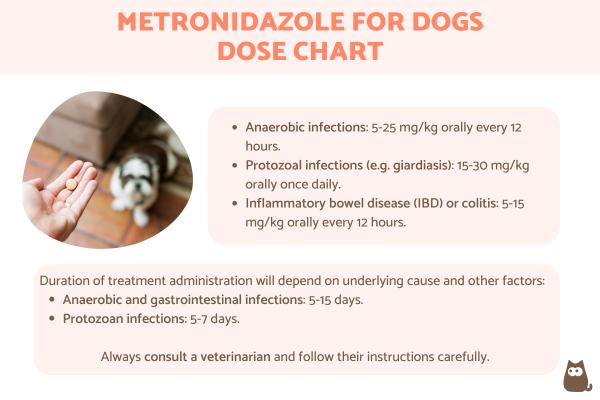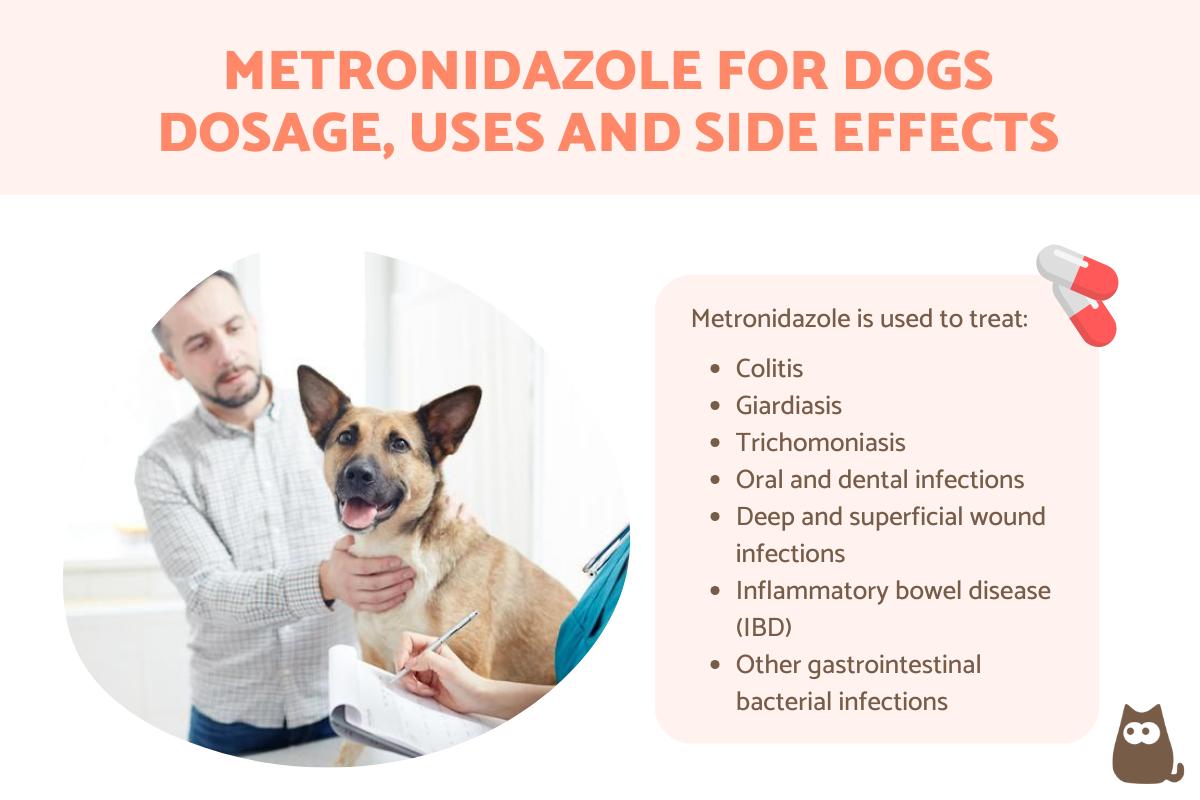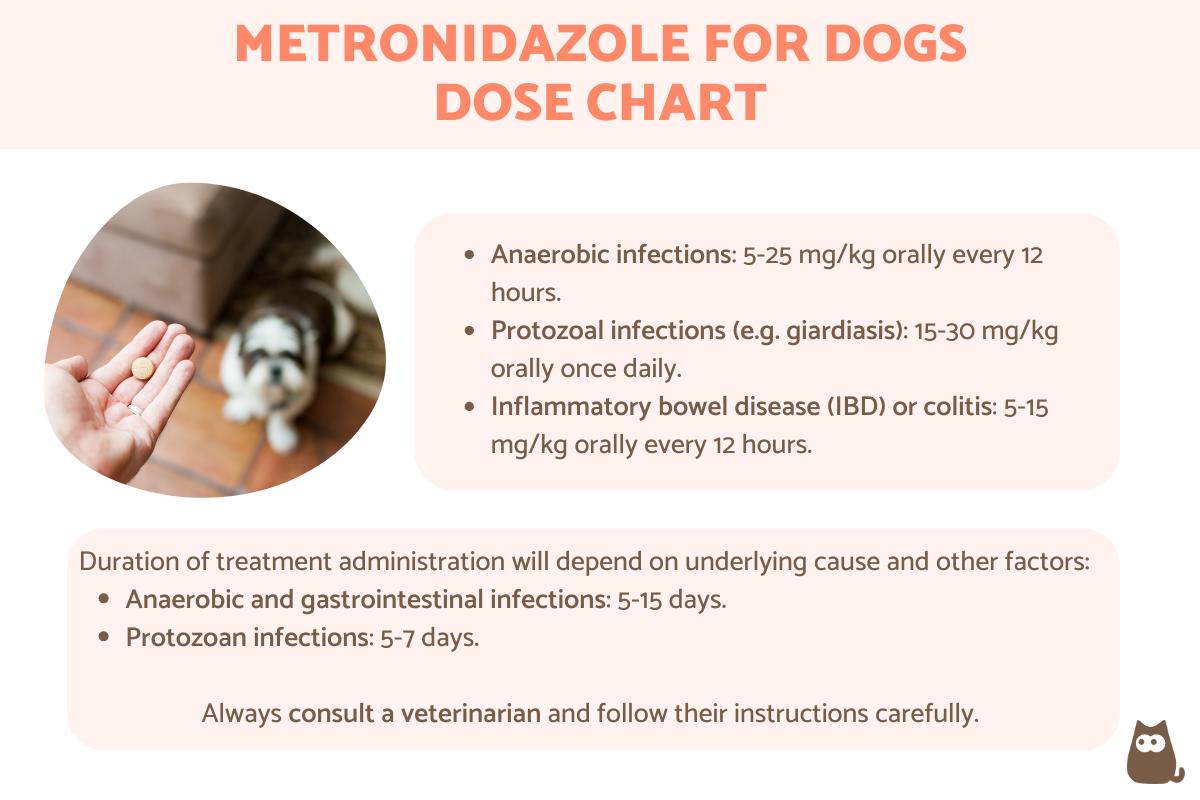Metronidazole for Dogs - Dosage, Uses and Side Effects



See files for Dogs
Metronidazole is a commonly prescribed antibiotic in human medicine, but it has also veterinary uses. Although antibiotics are used primarily to treat bacterial infections, metronidazole has some effectiveness against protozoan infections such as giardiasis. Often sold under the trade name Flagyl, it is important to know that we cannot give it to a dog without prescription. Human medicine should never be given to a dog unless under strict veterinary supervision. One important reason for this is that calculating metronidazole for dogs dosage is vital to ensure effectiveness and avoid overdose in the dog.
AnimalWised explains the metronidazole for dogs dosage, uses and side effects to see what you can expect if your dog is prescribed this medication. We also provide a dose chart for metronidazole for dogs, but this is a guide and not a replacement for veterinary advice.
What is metronidazole for dogs?
Metronidazole is both an antibiotic and antiprotozoal medication, being used against bacterial and protozoal infections, respectively. Despite being considered a broad-spectrum antibiotic, its use is more effective against anaerobic bacteria rather than aerobic bacteria. While this means its use as a bacterial agent is restricted, it also means it can be effective as a more targeted medication.
Its main uses are for infections of the gastrointestinal system, but it also has other uses. This can be seen in the fact it is sold under various preparations:
- Oral tablets
- Oral suspension
- Injectable solution
- Topical creams
Use of metronidazole as a topical cream is much more limited than oral tablets. Its injectable form is usually administered clinically by a veterinarian. Metronidazole is the active ingredient, but it is sold in various preparations under different trade names. Flagyl is the most common trade name for human use and this has a veterinary preparation also, but it may be more commonly seen sold under the names Metizol or Stomorgyl for use in dogs.
Metronidazole can also be used in combination with other antibiotics, sometimes even in the same medication. We better understand the uses of metronidazole for dogs in the sections below.
Uses of metronidazole for dogs
The uses of metronidazole are usually related to infections in the digestive system. It can also be prescribed for those of the urogenital system as well as oral, throat or skin lesions. It is also particularly used in infections which result in diarrhea in dogs. Generally speaking, metronidazole for dogs is used to treat the following:
- Colitis
- Giardiasis
- Trichomoniasis
- Oral and dental infections
- Deep and superficial wound infections
- Inflammatory bowel disease (IBD)
- Other gastrointestinal bacterial infections
Although parasitical infestations are a common cause of diarrhea in dogs, metronidazole is not generally used as a deworming agent. Protozoa such as giardia in dogs are parasitical organisms, but the diseases they cause are considered infections. Its use against giardia is usually instigated due to the presence of these parasites in the dog's stool, especially common in puppies or adolescent dogs.
Metronidazole may also be used to treat chronic diarrhea which is a result of inflammatory bowel disease (IBD) in dogs. This is an exaggerated response of the immune system which results in enteritis (inflammation of the intestine). When this occurs, it is possible metronidazole is prescribed in combination with other drugs .

Administration of metronidazole for dogs
We can find metronidazole in various preparations, which will make its administration easier, as it allows us to adjust the dose to the dog's weight and choose how it will be best accepted. If prescribed for home administration, metronidazole is usually given in tablet or oral suspension form. The tablets can be broken to adjust the dose, especially for larger dogs. Oral suspension is more common for puppies and smaller dogs.
In clinical or emergency settings, the veterinarian may opt for injectable metronidazole. This is usually left for dogs with more serious issues as the medication is administered intravenously and has a faster action.
Metronidazole for dogs dosage
The dosage of metronidazole for dogs will depend greatly on the size of the dog and the underlying cause which is being treated. For this reason, it is very important to follow the veterinarian's guidelines and instructions carefully. With this in mind, the following metronidazole for dogs dose chart can give you a general idea of the dosage according to the treatment:
- Anaerobic infections: 5-25 mg/kg orally every 12 hours.
- Protozoal infections (e.g. giardiasis): 15-30 mg/kg orally once daily.
- Inflammatory bowel disease (IBD) or colitis: 5-15 mg/kg orally every 12 hours.
The duration of the metronidazole treatment will also depend on the cause. For anaerobic infections and gastrointestinal inflammation, the treatment administration duration can be anywhere from 5 to 15 days. It is around 5-7 days for protozoal infections. It can be even longer in rare cases, but this usually means the treatment is not working and an alternative may be required.
As metronidazole is an antibiotic, it is especially important that we do not stop giving metronidazole every day that the veterinarian has indicated. This includes when the obvious infection symptoms have gone and the dog appears to be behaving normally again. The goal is complete recovery and not to risk bacterial resistance.

Side effects of metronidazole for dogs
Metronidazole is a drug that does not usually cause side effects, so adverse reactions are rare. If side effects do appear, the most common would be gastrointestinal problems. These include vomiting or loss of appetite. Sometimes signs of neurological disorders might develop and, in rare cases, liver disorders in the dog may occur. Generally speaking, side effects of metronidazole for dogs include:
- Vomiting
- Loss of appetite
- Weight loss
- Lethargy
- Weakness
- Neurological disorder symptoms
Symptoms could also appear if the dog consumes an overdose to the point of intoxication or in very prolonged treatments. That is why it is so important that we always follow the veterinarian's instructions. Signs of a metronidazole overdose in dogs include:
- Lack of coordination
- Tilting of the head
- Disorientation
- Nystagmus (i.e. rapid involuntary eye movements)
- Tremors
- Seizures
- Rigidity
Any sign like those mentioned is reason for urgent veterinary consultation. It is not recommended to give metronidazole to dogs with liver problems. Special care must also be taken if it is used in pregnant or lactating females. Only the veterinarian can decide its use.
How much does metronidazole for dogs cost?
The price of metronidazole will depend on the market in which it is sold, as well as the brand used. Generally speaking, name brand metronidazole such as Flagyl or Metizol will be more expensive. Generic brand metronidazole is usually cheaper. In the United States of America, the pricing is as follows:
- Generic brand: $0.30 to $1 per tablet.
- Name brand: $1 to $5 per tablet.
Oral suspension is usually sold in bottles of 100 ml. These will vary between $15 to $40 per bottle, again with the generic brands being on the cheaper end of the scale. Other markets around the world will have differing prices according to their legislations and other factors.
Discover another type of antibiotic given to companion animals with our article on Bactrim for dogs.

Is metronidazole for dogs safe?
Metronidazole is generally considered a safe drug in both human and veterinary medicine. Its effectiveness will depend on the problem which is being treated, but it is widely used for both is bactericidal and antiprotozoal properties. Reports of side effects are relatively rare, but this will depend on whether the dog has a sensitivity to the drug. For this reason, it is often first administered in the clinic to ensure its safety.
When metronidazole is not effective, it is common for the veterinarian to prescribe alternatives. Learn about an antiparasitic useful against giardia with our article on fenbendazole for dogs.
This article is purely informative. AnimalWised does not have the authority to prescribe any veterinary treatment or create a diagnosis. We invite you to take your pet to the veterinarian if they are suffering from any condition or pain.
If you want to read similar articles to Metronidazole for Dogs - Dosage, Uses and Side Effects, we recommend you visit our Medicine category.








